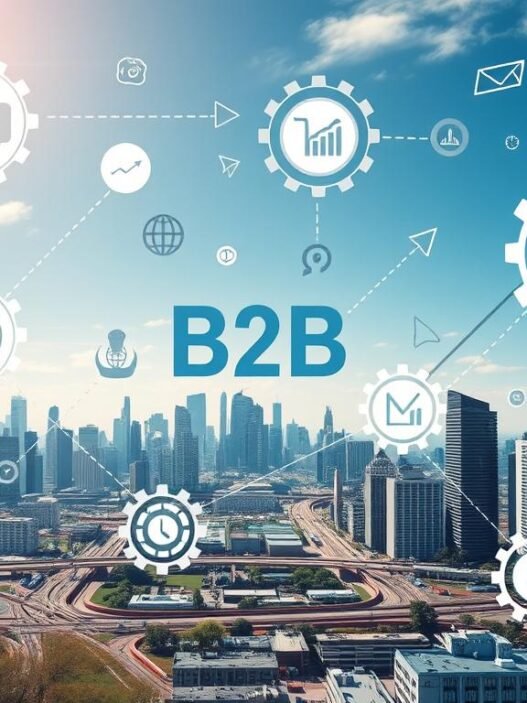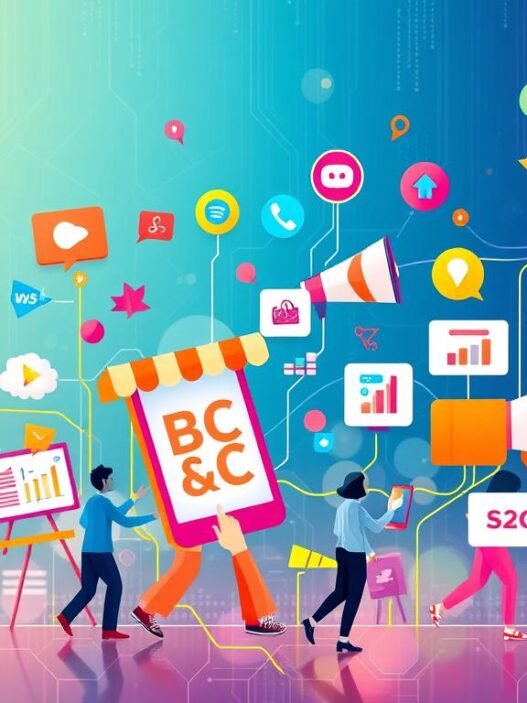Did you know that companies with strong Customer Relationship Management (CRM) practices can increase customer retention by as much as 27%1? Businesses now see how crucial CRM is for growth and keeping customers. It’s not just a nice-to-have; it’s a must-have.
Good CRM focuses on making customers happy and loyal. This leads to customers staying with you for longer, which is great for your business1. This article will share top tips and strategies to boost your CRM. This will help your business build stronger bonds with customers and meet their changing needs2.
Key Takeaways
- Effective CRM practices can significantly boost customer retention rates.
- Customer loyalty is enhanced through strong relationships and effective communication.
- CRM strategies are vital for understanding and adapting to customer behavior.
- Investing in CRM software can streamline customer interactions and improve relationships.
- Gathering customer feedback is essential for optimizing CRM efforts.
- Building trust with customers leads to long-term success and reduced skepticism.
The Importance of Customer Relationship Management (CRM)
In today’s market, CRM is key. It helps build strong customer ties, crucial for growth. All sizes of companies gain from a good CRM system, leading to more loyal customers3. In 2015, CRM software hit $26.3 billion, showing its big impact4.
CRM tools make customer service better and keep customers longer. A good CRM system lets businesses know their customers well. This way, they can talk to them in a way that feels personal3. It also helps find and serve the most important customers well.
There are many types of CRM, each for different needs. For example, Operational CRM is great for quick sales, like online shopping. Analytical CRM is for understanding market trends4. Collaborative CRM makes sharing customer info better, for a better customer experience4.
Understanding Customers: Key for Successful CRM
Knowing your customers is key to CRM success. It helps businesses talk to them in a way that matters. A McKinsey study found that 76% of people are more likely to buy from a brand that gets them5.
Using what you learn about customers can really boost sales and keep them coming back. In fact, 78% say they’re more likely to buy again if a brand personalizes for them5.
To get to know your customers better, try surveys, analytics, and really listening to what they say. Even though only 28% of companies use all their apps together, the benefits are huge. Tools like Salesforce CRM can help create a complete picture of your customers6.
When you understand what your customers need, you can solve problems before they even happen. Happy customers are more likely to keep coming back and spend more. This is a goal for every business6.
With AI, CRM systems can really listen to what customers are saying. This helps businesses tailor their services even better6.
Effective Communication Strategies in CRM
Good communication is key for strong customer relationships. Knowing what customers like and keeping them engaged is crucial. Email newsletters are great for sending out content and updates that fit each customer’s interests. Studies show that making emails personal can boost unique opens by 29%, showing how important it is to segment your audience7.
Also, 70% of businesses could do more with personalization, leaving a lot of room for growth7.
Email Newsletters for Customer Engagement
Email newsletters are a powerful tool for keeping customers interested. They let businesses share things that matter to their audience. Adding personal touches to these emails helps avoid spamming and keeps customers informed8.
By doing this, businesses can see better open rates and build customer loyalty8.
Utilizing Phone Calls for Personalized Connections
Phone calls offer a chance for more personal interactions. They allow businesses to provide immediate support and show they value each customer’s time. People prefer SMS and phone calls for updates because they’re direct and personal7.
This approach makes customers feel valued and strengthens their connection with the brand.
Building Relationships through Meetings
Meeting customers face-to-face is vital for building lasting relationships. It helps businesses understand what customers need, creating trust and loyalty. In-person talks are often better than online chats for sharing ideas and feedback8.
By making time for meetings, companies show they care about listening and adapting to customer needs8.
| Communication Strategy | Benefits | Ideal Use Case |
|---|---|---|
| Email Newsletters | Increased open rates, personalized content delivery | Regular updates and promotions |
| Phone Calls | Direct support, fosters personal connections | Immediate customer inquiries |
| Face-to-Face Meetings | Builds trust, deepens understanding | Client onboarding and feedback sessions |
In conclusion, using a mix of strategies like email newsletters, phone calls, and meetings is key for better customer engagement. These methods meet customer needs and show a commitment to lasting relationships78.
Leveraging Data for Enhanced Customer Insights
Data is key to better customer relationship management. Using customer surveys, companies can get valuable feedback straight from customers. This feedback is crucial for knowing how satisfied customers are and what needs work.
Surveys help businesses fine-tune their strategies to meet customer needs. This ensures they offer what customers want.
Surveys to Collect Valuable Feedback
Regular customer surveys are a must for businesses. They provide insights into what customers need and like. This helps companies tailor their products and services.
Using these insights, businesses can connect better with their audience. They can also act quickly on customer feedback. Surveys are a key part of CRM analytics, leading to better customer engagement and satisfaction9.
Utilizing Analytics to Track Customer Behavior
Analytics are essential for understanding customer behavior. By analyzing survey and social media data, businesses can spot trends and interests. Advanced algorithms help predict future behaviors based on past data10.
CRM analytics help businesses segment customers better. This leads to more focused marketing efforts. Such strategies boost conversion rates and foster loyalty by meeting customer needs9. Data analytics are vital for brands aiming to succeed in competitive markets.
Empathy: The Heart of CRM Success
Empathy is key in CRM, helping businesses connect deeply with customers. It makes interactions better. By using active listening, companies show they care and understand. This makes customers happier and more loyal.
Practicing Active Listening with Customers
Active listening means really paying attention to what customers say. It lets them share their needs openly. Studies show that focusing on customer happiness boosts employee engagement by 20%11.
This connection between employees and customers is crucial. It builds trust and loyalty over time.
Asking Open-Ended Questions to Understand Needs
Open-ended questions help understand what customers really need. They encourage customers to share more. CRM experts say daily self-reflection boosts emotional intelligence, essential for reading customer emotions12.
This skill helps CRM professionals get to know customers better. It’s good for both the company and customer loyalty.
Putting empathy first strengthens relationships and boosts performance. It makes sure the company meets customer needs1211.
Building Trust and Loyalty with Your Customers
Building trust with your customers is key to lasting relationships. When brands show they care, customers stick around. Brands that connect emotionally find their customers 70% more valuable13.
By sharing knowledge and insights, businesses can win trust. This helps reduce doubts and encourages customers to get involved.
Proving Your Value through Relevant Information
Sharing tailored advice and educational content makes a big difference. Personalized experiences build stronger bonds. CRM users see a boost in customer happiness, leading to better retention14.
Listening to feedback, whether it’s good or bad, shows you’re open. This builds trust in your CRM efforts.
Delivering Consistent Solutions and Advice
Consistency is crucial for keeping customers loyal. Being transparent in your business practices helps build trust. Financial institutions using CRM see a 25% jump in customer retention14.
Offering timely and reliable advice improves customer experiences. This leads to stronger, growing relationships.

Businesses that focus on understanding and valuing their customers tend to see better loyalty and value. By engaging with customers and meeting their needs, companies can stand out in a crowded market. Trust in CRM is at the heart of customer-focused strategies, paving the way for lasting success13.
Choosing the Right CRM Software for Your Business
Finding the right CRM software is key to managing customers well. Over two-thirds of customers want consistent updates across all platforms15. It’s important to pick CRM software that can handle different sources well.
Many small business owners want to move past spreadsheets for better customer data management16. They might also want to replace old systems that don’t help with customer satisfaction. Knowing what each CRM platform offers is crucial. Look for features like lead management, customizable dashboards, and reporting16.
Most companies use around 1,000 apps, but 70% say these tools don’t work well together15. CRM platforms like Salesforce and HubSpot help by integrating well. This makes workflow smoother and boosts productivity.
Higher-priced CRM systems often have more features and customization options for sales teams16. Using these advanced tools can lead to more sales. This is because they help focus on the most promising leads with AI insights15.
| CRM Platform | Key Features | Pricing Model |
|---|---|---|
| Salesforce | Lead management, dashboards, customizable reports, mobile access | Subscription-based, tiered pricing |
| HubSpot | Email marketing, analytical tools, contact management | Freemium model available, paid tiers for advanced features |
| Zoho CRM | Multi-channel communication, workflow automation, sales forecasting | Flexible plans with monthly or annual billing |
Setting Clear Goals to Drive CRM Success
Clear CRM goals are like a roadmap for success. They help organizations align with big business goals, like making customers happier and keeping them coming back. Harvard Business Review says that just a 5% increase in customer retention can boost profits by 25% to 95%17.
Setting goals right helps teams tackle big challenges. For example, nearly 32% of people say better use of data and team alignment are key to better customer experiences17.
SMART goals offer a clear way to track progress. This approach builds a culture of responsibility in CRM teams. It leads to better communication and work flow, helping businesses grow18.
Having all customer data in one place helps find and win new customers. This saves money on getting new customers. A solid goal plan is essential for using CRM tools well, making work more efficient and accurate18.
Getting everyone involved in setting goals makes sure everyone is on the same page. This improves the customer’s journey and boosts CRM success. Also, tracking time and performance shows how well CRM goals are being met19.
Implementing a Comprehensive CRM Strategy
A good CRM strategy is key for any business wanting to better connect with customers. It’s about setting clear roles and tasks to meet goals. This is crucial for improving customer interactions and building strong relationships.
Creating a Solid Implementation Plan
Creating a solid plan involves looking at several things. This includes budget, how it will work with other systems, and what the business needs. Tools like Zapier, Slack, and QuickBooks help connect with other systems smoothly.
With a well-implemented CRM, businesses see better customer retention and sales. They make smarter choices because of this2021.
Customizing Your CRM for Better Fit
Customizing your CRM is vital for its effectiveness. It makes the system fit your business better. This way, users find it easier to use, and it helps meet business goals.
Using CRM for personalized communication can really help customer relationships22. A smart customization approach makes operations smoother. It also leads to better customer insights through data management.
Maintaining Clean and Accurate CRM Data
Keeping CRM data clean and accurate is key for good CRM management and data integrity. Data can decay by 30% to 70%, showing the need for regular updates and cleaning23. Companies must use strong data cleaning methods to get rid of duplicates and wrong information. This helps avoid bad decisions.
More than 91% of companies with 10 or more employees use CRM systems24. This shows how important good data management is for everyone.
It’s important to train CRM users on how to manage data well. Bad data can lead to missed chances because of spam and fake info24. Simple mistakes, like typos, can make contact info useless. And old data might target the wrong people24.
Using data validation checks can help avoid wrong or missing data. This makes customer info more reliable. Also, automating data updates helps sales and marketing teams reach out to prospects better24.
Having a clear process for checking data quality and doing regular audits is helpful. It lets you find and fix data problems early. It’s also important to integrate systems to bring data from different places together. This makes it easier to use customer insights23.
By using good CRM data management and cleaning tools, companies can keep their data accurate and current. This is crucial for good customer interactions.
Training Your Team for Effective CRM Utilization
Effective CRM usage starts with good CRM training. It teaches teams how to get the most out of their CRM systems. A solid training plan is key to help teams use the system well. It should have clear goals that match the company’s aims and each team member’s role25.
Knowing how familiar team members are with CRM systems makes training better. Training should fit each person’s level of experience. Using different team training strategies, like virtual workshops or video tutorials, helps everyone learn in their own way26.
Interactive training helps team members understand and remember more. It makes them more active and interested. Also, having support after training, like guides and a 24/7 help desk, is very important2526. This support should keep up with any new CRM features or updates.
Having a team to help with CRM questions is a big plus. It gives quick and helpful answers. Regular training keeps staff up-to-date with CRM changes. This lets them use the system to its best27. Asking for feedback helps improve training, making it better for everyone.
Leveraging CRM Reports and Analytics
CRM analytics give a full view of customers, improving sales, marketing, and customer service28. Companies that use CRM analytics well see better profits and steady growth28. It’s key to pick the right metrics to get the most from this data28.
It’s important to collect good data to make sure it’s trustworthy and consistent28. Tools like heatmaps and social sentiment analysis give new views on how customers act28. Mixing data insights with human judgment is crucial for making smart decisions and leading teams28.
CRM software offers reports on profits, sales, and customer service29. These reports, like sales forecasts, show future earnings, helping businesses plan29. They also check how well CRM efforts are doing by looking at sales and customer service29.
Bonsai CRM reports are great for agencies, showing how campaigns and sales are doing29. They help turn data into useful actions, improving customer management and growing the business29.

Conclusion
Effective Customer Relationship Management (CRM) involves understanding customers and building lasting relationships. It helps businesses improve customer satisfaction and loyalty. This leads to more sales and revenue3031.
A good CRM strategy uses communication, empathy, and the right technology. It also focuses on team training. This approach not only betters customer relationships but also boosts business growth, especially for small businesses30.
By following these expert tips, organizations can tailor their interactions. They use valuable data to meet and exceed customer expectations. This strengthens their market position and ensures long-term success in a competitive world31.
















